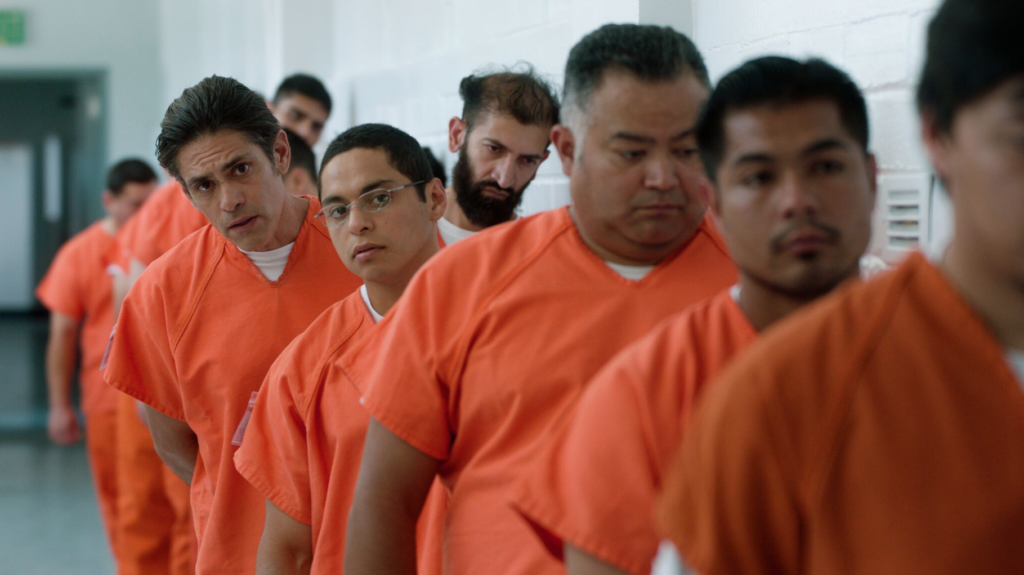Cristina Ibarra has been making award-winning films that explore the U.S.-Mexico border for the past 16 years. Her PBS-broadcast documentary “Las Marthas” premiered on “Independent Lens” in 2014. Her documentary collaboration “The Last Conquistador” had a national broadcast on “POV.” Her short fiction film “Dirty Laundry: A Homemade Telenovela” won multiple awards and was broadcast nationally on many PBS strands.
“The Infiltrators” opens today, May 1, via virtual cinemas. Audiences can purchase a ticket through a participating theater’s website. The doc, which is co-directed by Alex Rivera, will have traditional cable on-demand/digital streaming release on June 2.
W&H: Describe the film for us in your own words.
CI: This documentary-narrative hybrid follows the audacious infiltration of an immigration detention center by Dreamers, undocumented youth, who challenge our government’s immigration policies with their own bodies. They get arrested by border patrol on purpose to break into immigration jail, expose the injustices of the immigration system, and try to get other detainees out, including themselves.
It is a true story that tells a new kind of immigration narrative — one that sees immigrants not as victims, but as sophisticated protagonists who are in full control of their power. They don’t wait for permission to act.
W&H: What drew you to this story?
CI: I saw a testimonial of a young undocumented woman declaring, “Mami y Papi, if you are watching this, it is because I have been arrested.” She was staring straight at the camera, fearless about the risk she was about to take. Her power gave me chills. She was preparing for an act of civil disobedience and was fully expecting to go to jail, and not knowing if she would ever return home. The way she held her head up high with a sense of moral authority gave me hope. She reminded me that power isn’t given to you. You take it.
She was part of a movement of Dreamers who started performing acts of civil disobedience to create political support for The Dream Act legislation. The infiltrators actions remind me that, as a society, we too readily accept things as they are — even if we don’t believe that it is fair or just. And, even from our own comfortable place, we can speak up against accepting a system that hurts our sense of humanity as “normal.”
W&H: What do you want people to think about when they are leaving the theater?
CI: I want audiences to feel as if they’ve watched a heist movie. This is a reverse heist — our protagonists are breaking into jail. I want to break down the stereotypical immigrant story of the poor, suffering victim. The Dreamers are tapping into one of the most problematic issues of our present time. They are also tricksters, using the master’s tools against the system. They are bringing to light what we are not supposed to see, and asking the American public to address them.
In this way, I would like people to feel as if they getting a new portrayal of immigrants in America. In this portrayal, we don’t see immigrants as criminals or victims, but as sophisticated political players taking serious risks to fix a broken immigration system.
W&H: What was the biggest challenge in making the film?
CI: The documentary footage that inspired this film came with organic limitations. Once the infiltrators are successfully detained, then we loose them from our camera’s sight. We couldn’t take the camera inside the detention center. How do you show what you cannot see? We developed our hybrid storytelling style out of necessity.
The concept was very clear to us from the beginning. We would illustrate what happens inside the detention center with actors and drama based on our documentary interviews as well as observational and archival footage.
The challenge was in building the storytelling elements in reverse. We had to edit the documentary footage before we could write a script. Once we understood where our narrative had black holes, literally, then we developed a storyboard. The script was written after our documentary edit. “This never happens” is something we grew accustomed to hearing from many of our artistic collaborators.
W&H: How did you get your film funded? Share some insights into how you got the film made.
CI: This is not only the most important film I have ever made, it is also the most expensive. This film was funded through the documentary space. Our partners really had to take a leap of faith that our idea of mixing actors and documentary footage would work. This was not easy and it took time to secure the right partners little by little.
Teaming up with other producers and going to networks such as the Tribeca’s All Access and the Catalyst Forum was what really got our pitch into shape. We finally connected with Chicago Media Project, who took the bold step of becoming an equity partner and bringing this film to completion.
This film is not only a creative hybrid of storytelling forms, it is also a hybrid of different types of funds. We were awarded grants, stock donations, loans, and equity partners.
W&H: What inspired you to become a filmmaker?
CI: Making films is very personal to me. I grew up along the border where Mexican broadcast signals co-mingled with American channels. My desire to make films comes from an impulse to translate American culture to my immigrant parents. I came to film from a very naïve place, understanding that I could speak back to the images I was seeing.
W&H: What’s the best advice you’ve received?
CI: Stand in your power.
W&H: Name your favorite woman-directed film and why.
CI: I love Lourdes Portillo’s “The Devil Never Sleeps” because of the way she uses noir techniques in a personal essay-style film.







